Sure Adam Bock misses his friends in the Bay Area. But the Canadian playwright, who moved from San Francisco to New York about five years ago, really misses the food.
 “Food in San Francisco is so yummy,” he says. “It’s just not the same in New York. I don’t know what it is about the Bay Area — maybe all that produce or the fact that people there like to eat so much.”
“Food in San Francisco is so yummy,” he says. “It’s just not the same in New York. I don’t know what it is about the Bay Area — maybe all that produce or the fact that people there like to eat so much.”
Still, Bock is hardly complaining. While in the Bay Area, he had to have a day job to supplement his career as a playwright (he assisted a typographer). But in New York, he’s been able to make a living solely from his writing.
In fact, he’s something of a hot commodity. Last year, his play The Thugs, about office temps who suspect someone might be killing people in their building (but no one will talk to them because they’re temps), won an Obie Award.
And his current off-Broadway show, The Receptionist, has been extended through the end of the month.
As much as he loves New York, Bock, 46, has not forgotten his Bay Area peeps. Encore Theatre Company, for whom he wrote the award-winning Five Flights, and Shotgun Players, for whom he wrote the award-winning Swimming in the Shallows, are teaming up to produce Bock’s The Shaker Chair.
“I love it,” Bock says, “because it’s my two gangs. Totally excellent.”
The play previews tonight and opens Saturday at Berkeley’s Ashby Stage.
 Commissioned by New York’s Playwrights Horizons and premiered at the Humana Festival of New Plays in Louisville, Ky., in 2005 (seen at left), The Shaker Chair is unusual in that it stars three middle-age women.
Commissioned by New York’s Playwrights Horizons and premiered at the Humana Festival of New Plays in Louisville, Ky., in 2005 (seen at left), The Shaker Chair is unusual in that it stars three middle-age women.
“I looked at the Playwrights Horizons audience and saw a lot of older women,” Bock explains. “I thought maybe I’ll write a play with an older woman. Or maybe three older women. Then I thought, `Who do I know like that?’ And (I) thought of my mom and my aunt, both of whom are activists, so I decided to make one an activist. I had also been reading `Anna Karenina’ and was interested in the sister, Dolly, so I decided to put her in, too.”
The title, The Shaker Chair, came to Bock in a flash. He knew that would be his title — if not why it was his title.
“I started researching the Shakers, and they’re like activists,” Bock explains. “To them, procrastination is a sin. That’s when the activist thing came together. How big should your circle of concern be? As big as your family or larger? That’s an important and interesting question for me. How much are we responsible for and how open should we be?”
 Bock also admits that Shaker chairs are beautiful objects (and yes, there is a Shaker chair in the play).
Bock also admits that Shaker chairs are beautiful objects (and yes, there is a Shaker chair in the play).
“The Shakers don’t really make the chairs much anymore,” Bock says. “The Shakers are a small group now. They were big in the 1800s, made all these beautiful communities where everything they did was beautiful and simple. Their artwork is unbelievable. Every action is a prayer. How they tended animals mattered, how they mowed the lawn mattered, what kind of clothes they wore mattered. It was all simple, beautiful, useful.”
The Shakers also believed in separating men and women and being celibate.
“There’s definitely strangeness involved with the Shakers, too,” Bock says.
The notion of simplicity is one that has appealed to Bock for a while. In Swimming in the Shallows, for instance, one of the main characters is searching for simplicity. In his own New York apartment, Bock says he’s also aiming for simplicity.
“I keep it as clear as I can,” he says. “I’ve always been interested in Japanese art, negative space and stuff like that. To be honest, it’s discouraging to see how much crap we have.”
In his quest to remain crap-free, Bock will focus his attention on upcoming projects, which include a screenplay deal with producer Scott Rudin (one of his potential topics is “a woman who wants to get rid of all her stuff”) and the production of his play The Drunken City at Playwrights Horizons. Bay Area actor Cassie Beck (the co-artistic director of Crowded Fire Theatre Company) will be in the cast when that show opens in March.
Drunken is about three women who get engaged at the same time, and during one of the bachelorette parties, one of the engaged ladies kisses a man who is not her fiance.
“You know how in a play, if someone’s drunk, we assume they’ll tell the truth?” Bock asks. “Well, I decided to have everybody drunk, and these girls are funny, funny, funny.”
The Shaker Chair continues through Jan. 27 at the Ashby Stage, 1901 Ashby Ave,. Berkeley. Tickets are $20 to $30. Call 510-841-6500 or visit www.shotgunplayers.org or www.encoretheatrecompany.org.


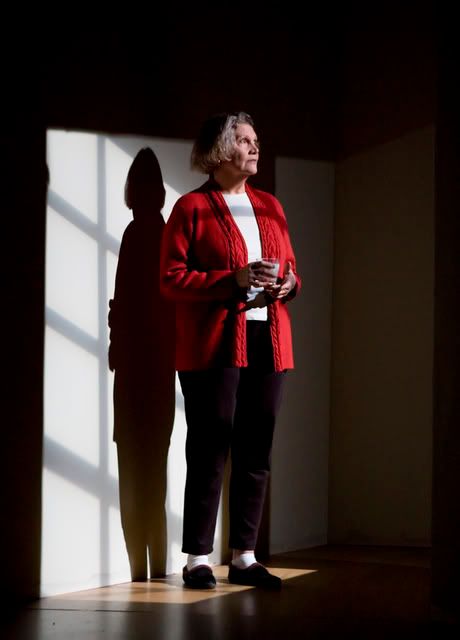
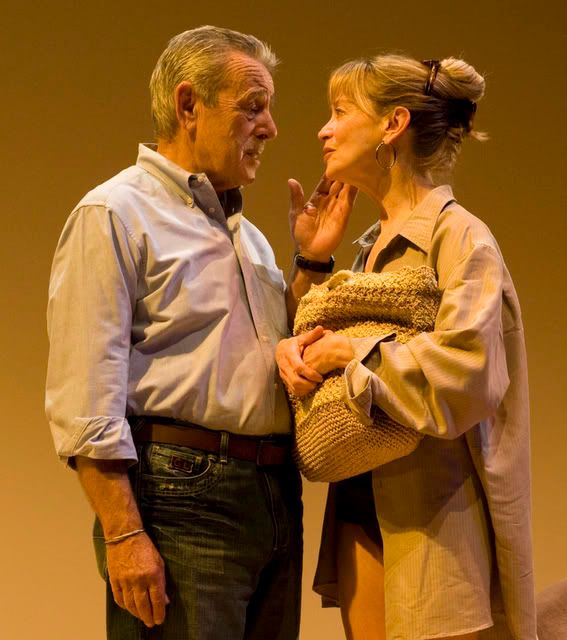
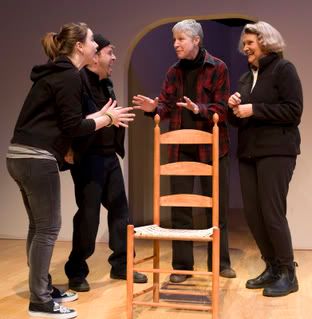
 “Food in San Francisco is so yummy,” he says. “It’s just not the same in New York. I don’t know what it is about the Bay Area — maybe all that produce or the fact that people there like to eat so much.”
“Food in San Francisco is so yummy,” he says. “It’s just not the same in New York. I don’t know what it is about the Bay Area — maybe all that produce or the fact that people there like to eat so much.” Commissioned by New York’s Playwrights Horizons and premiered at the Humana Festival of New Plays in Louisville, Ky., in 2005 (seen at left), The Shaker Chair is unusual in that it stars three middle-age women.
Commissioned by New York’s Playwrights Horizons and premiered at the Humana Festival of New Plays in Louisville, Ky., in 2005 (seen at left), The Shaker Chair is unusual in that it stars three middle-age women. Bock also admits that Shaker chairs are beautiful objects (and yes, there is a Shaker chair in the play).
Bock also admits that Shaker chairs are beautiful objects (and yes, there is a Shaker chair in the play).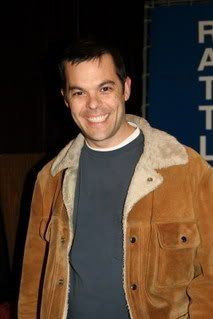
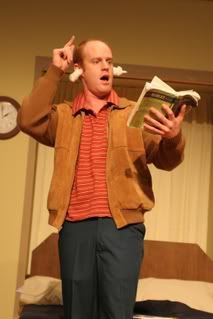
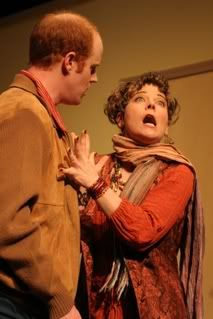




 work isn’t that well-known south of our northern border, but based on this dynamic, beautifully directed and performed piece,
work isn’t that well-known south of our northern border, but based on this dynamic, beautifully directed and performed piece, The electric jolt of Wilson’s language — “So, live!” are the play’s final words — coursed through the nearly three-hour show, but the sturdy cast, headed by Michele Shay as Aunt Ester, made it very much alive.
The electric jolt of Wilson’s language — “So, live!” are the play’s final words — coursed through the nearly three-hour show, but the sturdy cast, headed by Michele Shay as Aunt Ester, made it very much alive.